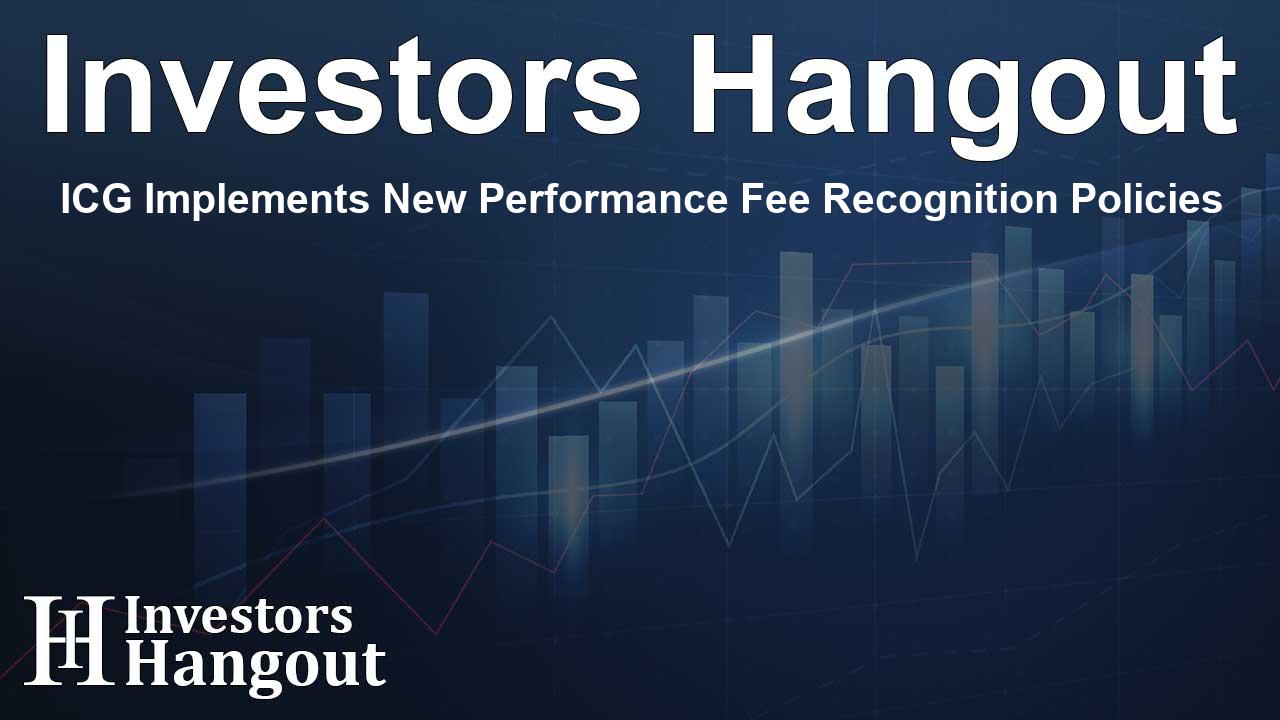ICG Implements New Performance Fee Recognition Policies

ICG Implements New Performance Fee Recognition Policies
In recent years, ICG plc (LSE: ICG) has made significant strides in boosting its assets under management (AUM) that earn equity-like fees. This remarkable growth of 3.0x over the past five years highlights the company's potential to generate higher performance fees. To enhance the clarity around performance fees, ICG is implementing a revised approach to how these fees are recognized in their financial statements.
Streamlined Recognition Process
The company has decided to modify the way performance fee revenue is recorded in its financial reports. This new method, set to take effect during their upcoming H1 FY26 results, aims to minimize management judgment and increase transparency in reporting.
Details of the New Approach
Under the revised strategy, performance fees for a fund will be recognized once the successor vintage achieves its first close, and the current investment period concludes. For instance, the recognition for Europe Mid-Market II will begin only after Europe Mid-Market III has its first close and Europe Mid-Market II completes its investment phase. This change is intended to precisely eliminate uncertainties regarding the timing of performance fee hurdles.
Additional Changes
Moreover, a discount related to an assumed fund lifespan has been extended from 10 years to 12 years. Performance fee revenue will continue to rely on the fund's valuation at the financial statement date, maintaining alignment with the previous approach.
Projected Financial Impact
With the adoption of this new accounting method, ICG expects to report a one-off gain ranging between £65 million and £75 million in their H1 FY26 results. Overall performance fees for this period are anticipated to be in the range of £90 million to £95 million.
Ongoing Financial Outlook
As the new recognition procedure is incorporated, performance fees are projected to become increasingly apparent in the initial years of a fund's lifecycle. ICG reassures stakeholders that while the recognition process has changed, the total performance fees collected throughout the life of a fund will remain unchanged. The rise in visibility of these fees is seen as a positive step, elevating the significance of performance fees as a revenue stream for the company.
No Immediate Cash Impact
It's important to note that these changes will not affect the total amount of performance fees ICG will secure over the funds' lifetimes, nor will they influence the timing of cash receipts. ICG will maintain its current reporting practices concerning performance fee revenue, realized cash performance fees, and accrued performance fees on the balance sheet to ensure consistent transparency.
Updated Performance Fee Guidance
As ICG enhances its performance fee potential through this new accounting method, the company is also revising its medium-term performance fee guidance. They now expect performance fees to account for 10% to 20% of total fee income, an increase from the previous guidance of 10% to 15%. Additionally, the FMC operating margin is projected to exceed 54%, up from an earlier estimate of 52%.
Company Presentation for Stakeholders
To discuss the new performance fee accounting methodologies, ICG will host a presentation for analysts and investors. This event is scheduled for the afternoon and aims to provide a comprehensive overview of these changes.
Key Company Information
ICG is regarded as a leading global alternative asset manager, boasting around $123 billion in AUM. The organization has been delivering impressive returns for over three decades, with a broad operational presence across 20 locations worldwide. ICG invests client capital across various strategies, including Structured Capital, Private Equity Secondaries, Private Debt, Credit, and Real Assets.
Exceptional Team and Responsible Investment
The company prides itself on its exceptional team, which is dedicated to unearthing unique investment opportunities, ensuring responsible investment practices, and delivering long-term value to its partners. By collaborating closely with management teams, founders, and business owners, ICG takes a solution-oriented approach that caters to their clients’ specific needs.
Frequently Asked Questions
What recent changes has ICG made regarding performance fees?
ICG has shifted to a new recognition method for performance fees, enhancing visibility and removing management judgment from revenue calculations.
How will these changes affect ICG’s financial statements?
The updated approach will allow for upfront recognition of performance fees, with a projected one-off gain expected in H1 FY26 results.
What is the expected financial impact for H1 FY26?
ICG anticipates total performance fees ranging from £90 million to £95 million, with a one-off gain between £65 million to £75 million.
Does this change affect cash flow from performance fees?
No, the changes will not impact the total cash flow from performance fees throughout the life of the fund or the timing of receipt.
What are ICG’s updated medium-term guidance projections?
ICG now expects performance fees to comprise 10-20% of total fee income and forecasts the FMC operating margin to exceed 54%.
About The Author
Contact Evelyn Baker privately here. Or send an email with ATTN: Evelyn Baker as the subject to contact@investorshangout.com.
About Investors Hangout
Investors Hangout is a leading online stock forum for financial discussion and learning, offering a wide range of free tools and resources. It draws in traders of all levels, who exchange market knowledge, investigate trading tactics, and keep an eye on industry developments in real time. Featuring financial articles, stock message boards, quotes, charts, company profiles, and live news updates. Through cooperative learning and a wealth of informational resources, it helps users from novices creating their first portfolios to experts honing their techniques. Join Investors Hangout today: https://investorshangout.com/
The content of this article is based on factual, publicly available information and does not represent legal, financial, or investment advice. Investors Hangout does not offer financial advice, and the author is not a licensed financial advisor. Consult a qualified advisor before making any financial or investment decisions based on this article. This article should not be considered advice to purchase, sell, or hold any securities or other investments. If any of the material provided here is inaccurate, please contact us for corrections.
